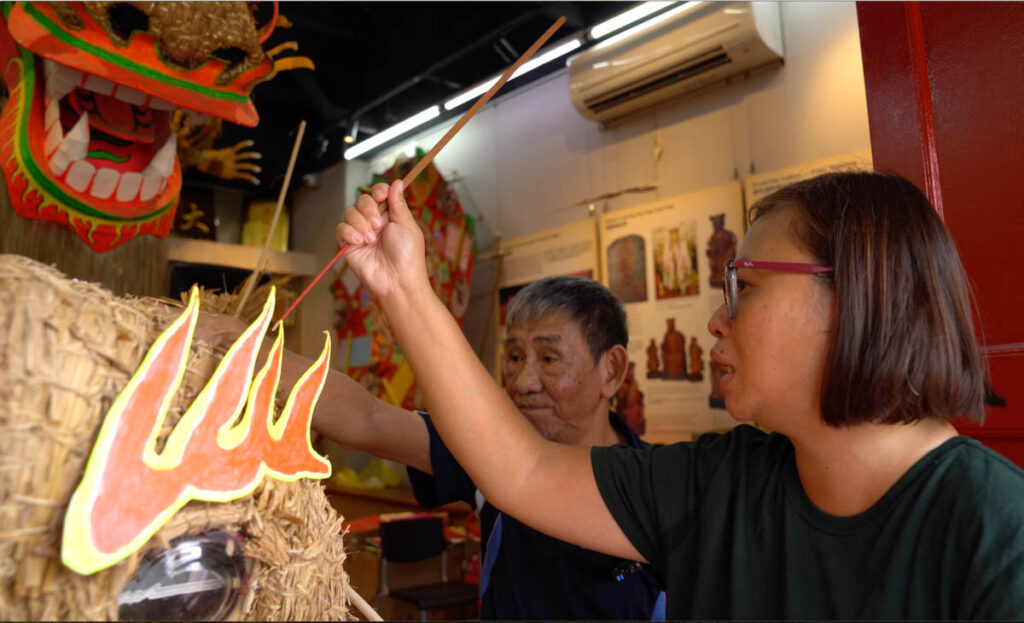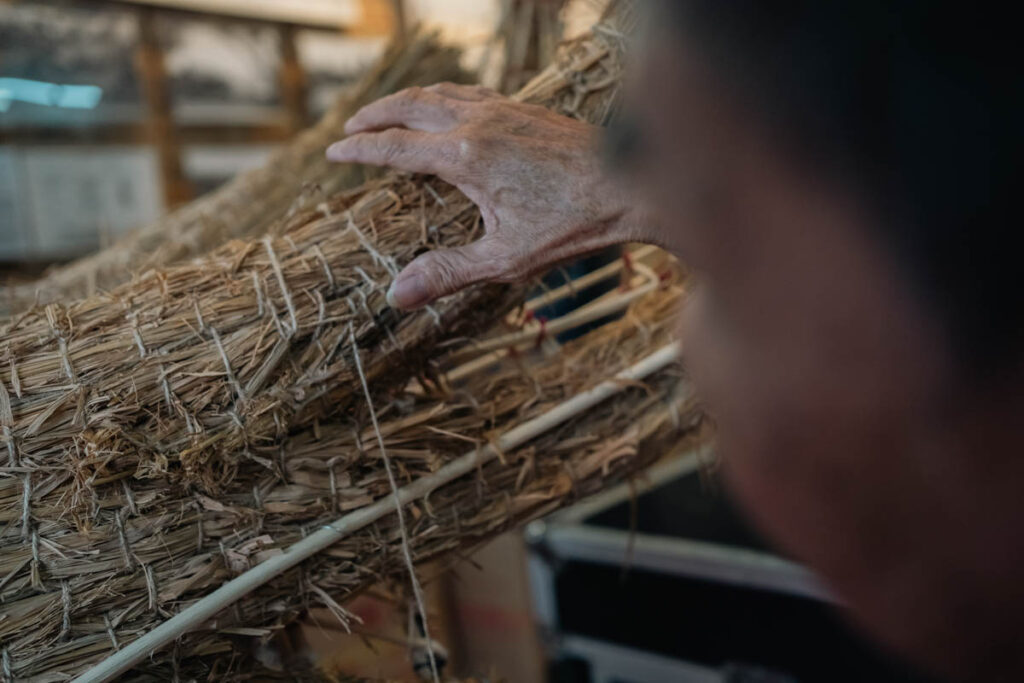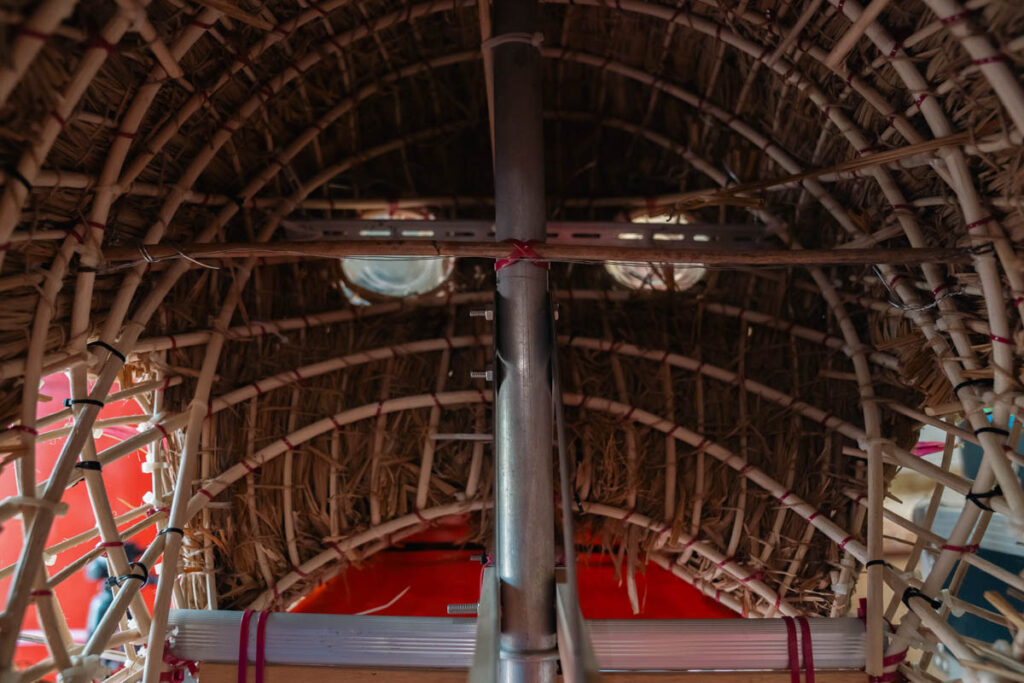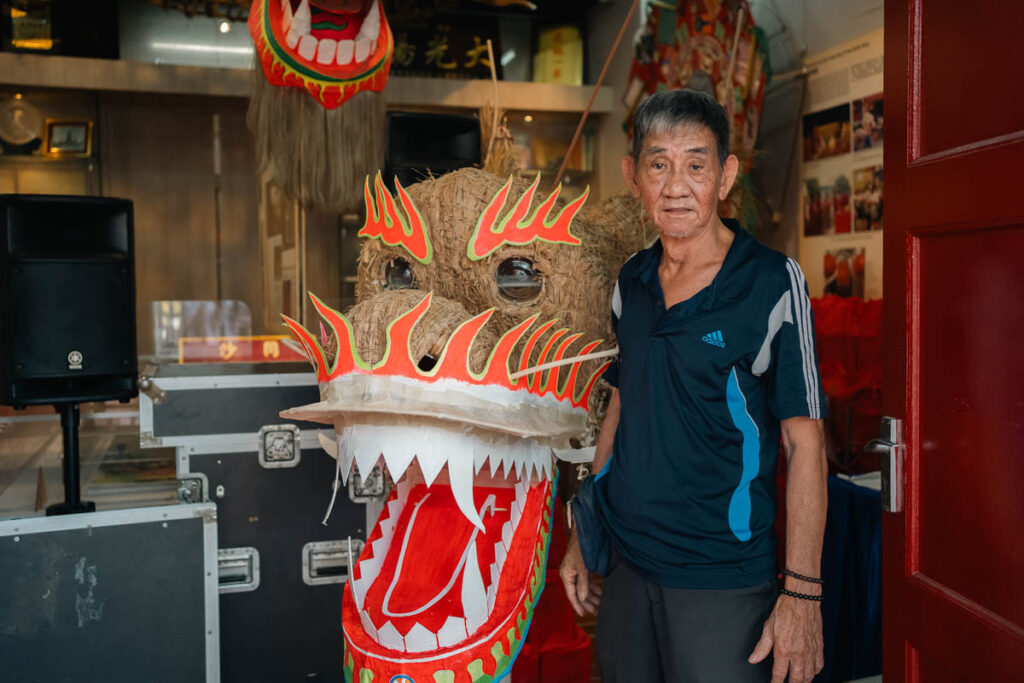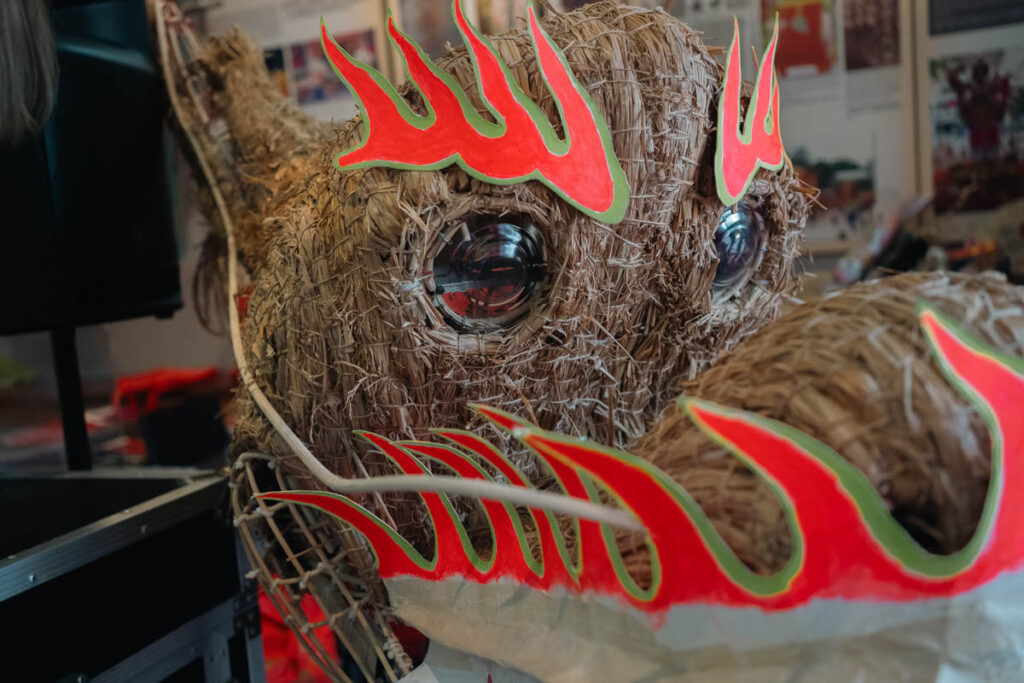
Angela Sim shares the story of Singapore’s fiery ceremony that farewells the dragon after its sojourn in our world.
The dragon 龍, a mythical creature, said to be majestic and unrestrained, is one of the four divine creatures in Chinese mythology alongside the turtle龟, phoenix 凤 and qilin 麒麟.
Given the highest status, the 5-clawed dragon is likened to that of the son of heaven1.“Section 1. Dragons and Phoenixes: Badges for the Imperial Family.” 2008a. Pasadena, CA: Pacific Asia Museum. https://cpb-us-e1.wpmucdn.com/sites.usc.edu/dist/8/725/files/2018/07/Section-1.pdf., the emblem adorning the robe of China’s emperor in the form of buzi 補子2.“Unmistaken Identity: A Guide to the Rank Badges of Ancient China.” 2022. Christies.com. Christie’s. August 18, 2022. https://www.christies.com/en/stories/unmistaken-identity—a-guide-to-the-rank-badges-of-chinese-imperial-officials-2144dabe08e6474ba07b830f6d1f70a8. dating back to the Ming Dynasty (1348-1644). Nobility as well as the emperor’s sons-in-law wore badges depicting revered, mythical creatures. These badges were also awarded to those who had proven themselves with meritorious or special service. As the military officers always sat to the right of the emperor in court, the animals sewn on this buzi faced left towards the emperor as a mark of respect. Each animal of the military rank insignia is said to symbolise the wearer’s tenacity.
Like many mythological creatures, there is not one single, absolute description of the dragon: it has been portrayed in diverse ways, depending on the source. Although the dragon has never been sighted by the human eye, its form is made up of different animals -the nose of a lion, a tiger’s mouth, ears of an ox, goldfish eyes, antlers of a deer, eagle claws trimmed with fur, the underbelly of a clam and an energetic snake-like body. 3.徐华铛 . 2015. 神兽(中国传统形象图说). 中国林业出版社; 1st edition (May 1, 2015) pg9. The dragon is revered by the Chinese as an auspicious symbol, it has become spiritual sustenance to conquer nature and to drive away evil. There are at least 11 types of dragons, some can be found in the water, sky, and some on land as well.4. 徐华铛 . 2015. 神兽(中国传统形象图说). 中国林业出版社; 1st edition (May 1, 2015) pg7-33. In Singapore, the most significant representation of the dragon can be found in the form of the dragon dance. In this traditional dance accompanied by percussion instruments, the elongated dragon chasing the pearl of wisdom hoisted on poles, is the star of the show. The dragon dance is said to have its roots in the Han Dynasty (206BCE – 220CE)5.Singapore, National Library Board. n.d. “Dragon Dance.” Www.nlb.gov.sg. https://www.nlb.gov.sg/main/article-detail?cmsuuid=848b0702-f59e-4ab6-8dc7-3f7f218131b7., the dance was performed to pray for or celebrate a good harvest, particularly to seek clement weather.It is customary to have Chinese dragon dance troupes perform during auspicious and special occasions such as the Lunar New Year which is just around the corner or when seeking good fortune for one’s new business or home.
Hidden in the quiet and quaint estate of Sims Drive in Geylang, is the home of the fire dragon稻草香火龍. There are only two such dragons in the world, the other being in Hong Kong. This dragon is paraded only once every three years on the 2nd day of the 2nd lunar month to celebrate the birthday of the Earth Deity 土地爷爷 and is not commonly seen in metropolitan Singapore. The dance of the fire dragon has become a unique identity associated with the temple, Sar Kong Mun San Fook Tuck Chee 沙岡萬山福德祠. This art form originated from Guangdong in South China, and it was brought to Singapore in the 1980s6.Ang, Yik Han. 2016. A Kampong and Its Temple. Mun San Fook Tuck Chee. Pg107.
According to the 1901 stelae inscription, the temple was said to be established during the early years of the 1860s. The temple came to its present site at Sims Drive in 19017.Ang, Yik Han. 2016. A Kampong and Its Temple. Mun San Fook Tuck Chee. Pg28.. Sar Kong meaning ‘sand dune’, the village in the Kallang Basin, takes its name from the sandy deposits which attracted the earliest brick kiln operators to set up their kilns in the vicinity8.Ang, Yik Han. 2016. A Kampong and Its Temple. Mun San Fook Tuck Chee. Pg42.. As kampong life centred around the temple, the biggest festivities were temple celebrations.
I have been most fortunate to witness in person the painstaking process that involves the use of rattan for making the core skeleton frame, the plaiting of dried rice stalks and stitched by hand using a sharp metal hook to form the head, the claws as well as the body of the dragon by Master Zhen 甄明仔. There are only two master craftsmen in Singapore, another is Master Fong Keng Yuan 冯景源, who can construct the head and tail which are said to be more difficult compared to the body segments.
Festooned with more than 3000 sticks of burning joss sticks, measuring a length of more than 60 meters, and weighing more than 65kg, it is quite a feat. A total of 60 people9.Chia, Caroline. 2012. “Catch the Water Dragon NewspaperSG – the Straits Times, 21 January 2012.” Eresources.nlb.gov.sg. January 21, 2012. https://eresources.nlb.gov.sg/newspapers/digitised/issue/straitstimes20120121-1. parade around the temple, it is very much a community-driven event.
The fire dragon borne by the dragon dancers, engulfed in smoke, guided by the pearl of wisdom in breathtaking manoeuvres is very impressive. The fire dragon dance is performed on borrowed time, dependent on the burning of the joss sticks, it will annihilate when the joss sticks singe their ends. Traditionally the exorbitant number of incense sticks were used as after each performance, the dragon would be left to rest, devoured by the flames, ending its sojourn in the human world, ascending to the heavens bearing the wishes and sentiments of the devotees.
Just like the incandescent flames, the dance of the fire dragon of Sar Kong Mun San Fook Tuck Chee has brought vibrancy to the shores of the tiny island, Singapore.
About Angela Sim
Angela Sim is a researcher of Asian heritage and culture. She uses her platform as a media content creator to explore areas such as folk religion, Peranakan culture, and sunset industries including Chinese woodblock printing, effigy restoration, and lantern making. Angela is a Singapore native and promotes the nation as a cultural destination. Angela earned a Bachelor of Arts Degree majoring in Japanese Art History. Her video content can be found on YouTube publishing as Hakka Moi. Contact angelasguild@gmail.com
Related stories
Punk Rocks ✿ The Hope Pebble
Jumaadi ✿ You're invited to a snakes' wedding
Dragon Scale Binding: The revival of an ancient Chinese book format
Aricò's Calabrian dragon
Mancapat: Heritage batik from today's soil
Rirkrit Tiravanija materialises in Singapore
Madhvi Subrahmanian ✿ Pandemic Pills
He stood up! ✿ Winds of change at the Ancient Now symposium
References
| ↑1 | “Section 1. Dragons and Phoenixes: Badges for the Imperial Family.” 2008a. Pasadena, CA: Pacific Asia Museum. https://cpb-us-e1.wpmucdn.com/sites.usc.edu/dist/8/725/files/2018/07/Section-1.pdf. |
|---|---|
| ↑2 | “Unmistaken Identity: A Guide to the Rank Badges of Ancient China.” 2022. Christies.com. Christie’s. August 18, 2022. https://www.christies.com/en/stories/unmistaken-identity—a-guide-to-the-rank-badges-of-chinese-imperial-officials-2144dabe08e6474ba07b830f6d1f70a8. |
| ↑3 | 徐华铛 . 2015. 神兽(中国传统形象图说). 中国林业出版社; 1st edition (May 1, 2015) pg9. |
| ↑4 | 徐华铛 . 2015. 神兽(中国传统形象图说). 中国林业出版社; 1st edition (May 1, 2015) pg7-33. |
| ↑5 | Singapore, National Library Board. n.d. “Dragon Dance.” Www.nlb.gov.sg. https://www.nlb.gov.sg/main/article-detail?cmsuuid=848b0702-f59e-4ab6-8dc7-3f7f218131b7. |
| ↑6 | Ang, Yik Han. 2016. A Kampong and Its Temple. Mun San Fook Tuck Chee. Pg107 |
| ↑7 | Ang, Yik Han. 2016. A Kampong and Its Temple. Mun San Fook Tuck Chee. Pg28. |
| ↑8 | Ang, Yik Han. 2016. A Kampong and Its Temple. Mun San Fook Tuck Chee. Pg42. |
| ↑9 | Chia, Caroline. 2012. “Catch the Water Dragon NewspaperSG – the Straits Times, 21 January 2012.” Eresources.nlb.gov.sg. January 21, 2012. https://eresources.nlb.gov.sg/newspapers/digitised/issue/straitstimes20120121-1. |

